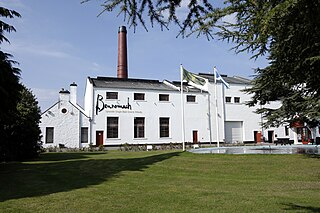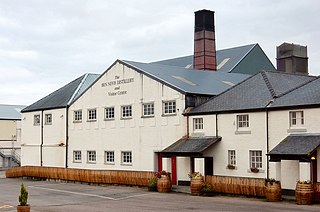
Scotch whisky, often simply called whisky or Scotch, is malt whisky or grain whisky made in Scotland.

Whisky or whiskey is a type of liquor made from fermented grain mash. Various grains are used for different varieties, including barley, corn, rye, and wheat. Whisky is typically aged in wooden casks, which are typically made of charred white oak. Uncharred white oak casks previously used for the aging of port, rum or sherry are also sometimes used.

Scotland is a well-developed tourist destination, with tourism generally being responsible for sustaining 200,000 jobs mainly in the service sector, with tourist spending averaging at £4bn per year. In 2013, for example, UK visitors made 18.5 million visits to Scotland, staying 64.5 million nights and spending £3.7bn. In contrast, overseas residents made 1.58 million visits to Scotland, staying 15 million nights and spending £806m. In terms of overseas visitors, those from the United States made up 24% of visits to Scotland, with the United States being the largest source of overseas visitors, and Germany (9%), France (8%), Canada (7%) and Australia (6%), following behind.

Islay single malts are the single malt Scotch whiskies made on Islay or Ìle in Gaelic, one of the southernmost of the Inner Hebridean Islands located off the west coast of Scotland. Islay is one of five whisky distilling localities and regions in Scotland whose identity is protected by law.

Single malt Scotch refers to single malt whisky made in Scotland. To qualify for this category, a whisky must have been distilled at a single distillery using a pot still distillation process and made from a mash of malted barley. Therefore, a single malt means that the whisky has not been blended elsewhere with whisky from other distilleries. As with any Scotch whisky, a single malt Scotch must be distilled in Scotland and matured in oak casks in Scotland for at least three years, although most single malts are matured longer.

Speyside single malts are single malt Scotch whiskies, distilled in Strathspey, the area around the River Spey in Moray and Badenoch and Strathspey, in northeastern Scotland.

Strathspey is a region of the Scottish Highlands comprising part of the valley of the Spey. It includes the towns of Aviemore, Boat of Garten, Grantown-on-Spey, and Aberlour.

The economy of Scotland is an open mixed economy, mainly services based, which is the second largest economy amongst the countries of the United Kingdom. It had an estimated nominal gross domestic product (GDP) of £218.0 billion in 2023, including oil and gas extraction in the country's continental shelf region. Since the Acts of Union 1707, Scotland's economy has been closely aligned with the economy of the rest of the United Kingdom (UK), and England has historically been its main trading partner. Scotland conducts the majority of its trade within the UK: in 2017, Scotland's exports totalled £81.4 billion, of which £48.9 billion (60%) was within the UK, £14.9 billion with the European Union (EU), and £17.6 billion with other parts of the world. Scotland's imports meanwhile totalled £94.4 billion including intra-UK trade leaving Scotland with a trade deficit of £10.4 billion in 2017.

Glen Grant distillery was founded in 1840 in Rothes, Speyside, and produces single malt Scotch whisky.

The Scotch Whisky Experience is a whisky visitor attraction located on Castlehill in the Old Town of Edinburgh, immediately adjacent to the esplanade of Edinburgh Castle. The centre offers tours and whisky tutoring sessions, alongside a shop, corporate spaces and Amber Restaurant & Whisky Bar.

Benromach distillery is a Speyside distillery founded by Duncan McCallum and F.W. Brickman in 1898 and currently owned and run by Gordon and Macphail of Elgin. It is situated near Forres in Morayshire and is fed with spring water from the Chapelton Springs in the Romach Hills beside Forres.

Glen Moray distillery is a Speyside distillery producing single malt scotch whisky. Situated on the banks of the River Lossie in Elgin, Moray the distillery started production in September 1897. It was sold in 2008 by the Glenmorangie Company Ltd. to La Martiniquaise.

The Glencairn whisky glass is a style of glass intended for drinking whisky, developed and produced by Glencairn Crystal Ltd, in East Kilbride, a town near Glasgow, Scotland since 1981; originally designed by Raymond Davidson, managing director of the company. The shape of the glass is derived from the traditional nosing copitas used in whisky labs around Scotland. The glass design was concluded with the aid of master blenders from five of the largest whisky companies in Scotland. The glass first came into production in 2001. Since then, additional mini-Glencairns and Canadian Glencairns were introduced. The Glencairn glass is made in Poland.

Strathisla distillery is a Speyside single malt Scotch whisky distillery in Keith, Moray. Is the oldest continuously operating distillery in the Scottish Highlands.
The Scotch Whisky Association (SWA) is a trade organisation that represents the Scotch whisky industry. The Scotch whisky industry is an important part of the Scottish economy, and particularly the Scottish export market.

Ben Nevis distillery is a whisky distillery in Fort William, Scotland. It is situated at the base of Ben Nevis, the highest mountain in the British Isles, which rises to 1,345 m (4,413 ft) above sea level.

The Scotch Whisky Regulations 2009 (SWR) is a statutory instrument that regulates the production, labelling, advertising and packaging of Scotch whisky. The regulations were laid before the Parliament of the United Kingdom on 30 October 2009, and came into force on 23 November 2009. They repealed the Scotch Whisky Act 1988 and the Scotch Whisky Order 1988.
Celtic Renewables Ltd. is the first company to produce biofuel from the by-products of the scotch whisky industry.

Nc'nean distillery is a Scotch whisky distillery in Drimnin on the Morvern peninsula of the Highlands, Scotland. The distillery is beside the Sound of Mull, opposite the Isle of Mull. The distillery name Nc'nean, comes from "Neachneohain", a Gaelic legend which translates as the Queen of Spirits.














